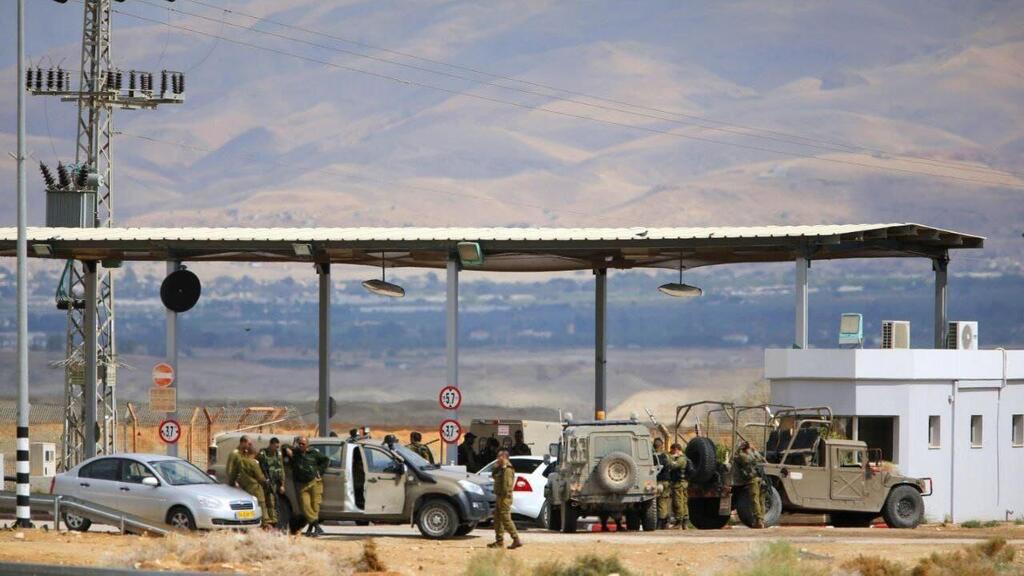Getting your Trinity Audio player ready...
Jordan’s Al-Hawittat Bedouin clan on Monday lauded their relative Maher Al-Jazi's shooting attack that took place on Sunday at the Allenby Bridge Crossing in which he murdered three Israelis – Yuri Birnbaum, Adrian Marcelo Podsmeser and Yohanan Shchori.
“What our son has done was the natural response of a zealous person and patriotism to his Arab country in front of the ongoing crimes Israel commits against the Palestinian people in Gaza,” Al-Jazi's clan said in a statement.
According to the clan, the responsibility for the attack lies with Prime Minister Benjamin Netanyahu, saying it was "a result of Netanyahu and his current government’s malicious actions against the people of Palestine and Gaza." The clan stressed it was committed to its alliance with Jordan, both internally and externally.
The clan, located in the Ma'an area in southern Jordan, is highly loyal to the state. It participated in the fighting against Israel as early as 1948, but its loyalty also extends to the Palestinian cause. This, along with the significant social and economic challenges the clan faces, provides fertile ground for terrorism and anti-Hashemite activity, opposing the government's stance.
According to Professor Ronen Yitzhak, head of the Middle Eastern Studies division at Western Galilee College, the clan's statement mainly proves the attack was carried out by a lone perpetrator and not by an organized group. The reasoning provided by the clan's statement echoed sentiments expressed in Jordan, particularly the view of the attack as a "natural response."
"The clan expressed its loyalty to the Muslim nation and homeland. They show solidarity with the Palestinians but remain loyal to the state," Yitzhak said. He explained that the attack isn’t seen as a threat to national security in Jordan, as it was carried out by a lone individual. "If it had been an organized effort by the clan itself or a larger group, there might have been such a concern, but that’s not the case," he said.
Israel's security concern following attacks like Sunday’s includes the potential for copycat attacks or inspired individuals attempting to carry out similar acts. According to Yitzhak, the threat from the clan itself isn’t greater than that from other sources, despite the attack.
An interesting issue related to the clan is its relationship with the Jordanian government over the past decade, especially when compared to the relationship between the Palestinians and the government.
According to Yitzhak, King Abdullah II has implemented reforms in the country over the years, granting benefits to other groups such as the Palestinians. The Bedouin clans argued the king favored Palestinians at their expense, mainly due to his wife’s, Queen Rania, Palestinian background. "Another claim said Rania interfered with Bedouin customs," Prof. Yitzhak added, noting, "She tried to introduce more reforms and practices that the Bedouins didn’t like."
According to Prof. Yitzhak, King Abdullah II has implemented reforms in the country over the years, granting benefits to other groups such as the Palestinians. The Bedouin clans argued the king favored Palestinians at their expense, mainly due to the Palestinian background of his wife, Queen Rania. "Another claim said Rania interfered with Bedouin customs," Yitzhak added, noting: "She tried to introduce more reforms and practices that the Bedouins didn’t like."
Despite the tension between the clans and the government, from a broader perspective, these clans remain loyal to Jordan. Compared to the relationship between the government and the Palestinians, the tensions aren’t overwhelming.
The Palestinians are relatively content. Pro-Hamas protests in Jordan over the past few months were not led by Palestinians, but rather by supporters of the Muslim Brotherhood.






